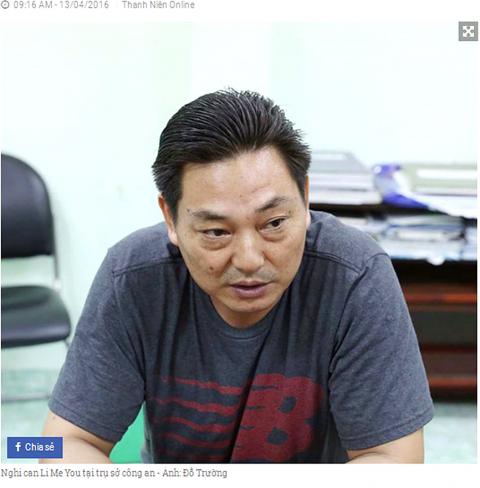The chairman of the Kingmaker Group (信星鞋業集團), a Taiwan-invested footwear company, has died from severe wounds after he was allegedly attacked by a manager at a factory in Vietnam, the Taiwan representative office in Ho Chi Minh City said yesterday.
Mickey Chen (陳敏雄), 63, died at a hospital in Taiwan on Thursday, two days after a he was allegedly attacked by a 45-year-old warehouse manager from China at the Kingmaker factory in Thuan An, Binh Duong Province, the office said.
An argument erupted when Chen allegedly questioned the manager, identified by his surname, Li (李), over shoes missing from the inventory, an official at the office said.

Photo: CNA, from the Tuoi Tre Web site
Li allegedly waved a knife and slashed Chen and other factory managers, the official said.
Other factory workers subdued Li and drove the injured to hospital for emergency treatment.
Vietnamese police arrested Li and have launched an investigation, the official said.
Chen was flown to Taiwan on a medical aircraft on Thursday morning, but because of the severity of his wounds he could not be saved, the office said.
Two Taiwanese managers who were also injured in the attack were discharged from a hospital in Thuan An on Thursday, the office said.
Kingmaker, established by Chen in 1981 in Changhua County, opened the Thuan An factory 15 years ago.
The footwear manufacturer also has factories in China and Cambodia, and makes shoes for brands such as ASICS, CAT, Clarks, Fiona’s Prince, GH Bass, K1X, New Balance, Robeez, Skechers and Stride Rite, the group’s Web site says.
Kingmaker went public on the Hong Kong Stock Exchange in 1994 under the name Kingmaker Footwear Holdings Ltd (信星鞋業).
Kingmaker Group released a statement yesterday in Hong Kong saying that Chen had died, but it did not disclose the cause of his death.
Kingmaker Group shares fell by 4.4 percent to close at HK$2.17 on the Hong Kong Stock Exchange yesterday.

SEEKING CLARITY: Washington should not adopt measures that create uncertainties for ‘existing semiconductor investments,’ TSMC said referring to its US$165 billion in the US Taiwan Semiconductor Manufacturing Co (TSMC, 台積電) told the US that any future tariffs on Taiwanese semiconductors could reduce demand for chips and derail its pledge to increase its investment in Arizona. “New import restrictions could jeopardize current US leadership in the competitive technology industry and create uncertainties for many committed semiconductor capital projects in the US, including TSMC Arizona’s significant investment plan in Phoenix,” the chipmaker wrote in a letter to the US Department of Commerce. TSMC issued the warning in response to a solicitation for comments by the department on a possible tariff on semiconductor imports by US President Donald Trump’s

The government has launched a three-pronged strategy to attract local and international talent, aiming to position Taiwan as a new global hub following Nvidia Corp’s announcement that it has chosen Taipei as the site of its Taiwan headquarters. Nvidia cofounder and CEO Jensen Huang (黃仁勳) on Monday last week announced during his keynote speech at the Computex trade show in Taipei that the Nvidia Constellation, the company’s planned Taiwan headquarters, would be located in the Beitou-Shilin Technology Park (北投士林科技園區) in Taipei. Huang’s decision to establish a base in Taiwan is “primarily due to Taiwan’s talent pool and its strength in the semiconductor

An earnings report from semiconductor giant and artificial intelligence (AI) bellwether Nvidia Corp takes center stage for Wall Street this week, as stocks hit a speed bump of worries over US federal deficits driving up Treasury yields. US equities pulled back last week after a torrid rally, as investors turned their attention to tax and spending legislation poised to swell the US government’s US$36 trillion in debt. Long-dated US Treasury yields rose amid the fiscal worries, with the 30-year yield topping 5 percent and hitting its highest level since late 2023. Stocks were dealt another blow on Friday when US President Donald

UNCERTAINTY: Investors remain worried that trade negotiations with Washington could go poorly, given Trump’s inconsistency on tariffs in his second term, experts said The consumer confidence index this month fell for a ninth consecutive month to its lowest level in 13 months, as global trade uncertainties and tariff risks cloud Taiwan’s economic outlook, a survey released yesterday by National Central University found. The biggest decline came from the timing for stock investments, which plunged 11.82 points to 26.82, underscoring bleak investor confidence, it said. “Although the TAIEX reclaimed the 21,000-point mark after the US and China agreed to bury the hatchet for 90 days, investors remain worried that the situation would turn sour later,” said Dachrahn Wu (吳大任), director of the university’s Research Center for